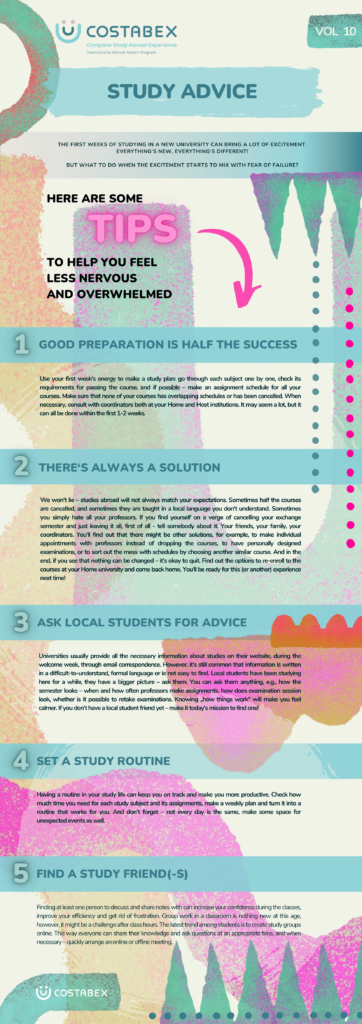The first weeks of studying in a new university can bring a lot of excitement. Everything‘s new, everything‘s different! But what to do when the excitement starts to mix with fear of failure?
Here are some tips to help you feel less nervous and overwhelmed.
- Good preparation is half the success. Use your first week‘s energy to make a study plan: go through each subject one by one, check its requirements for passing the course, and if possible – make an assignment schedule for all your courses. Make sure that none of your courses has overlapping schedules or has been cancelled. When necessary, consult with coordinators both at your Home and Host institutions. It may seem a lot, but it can all be done within the first 1-2 weeks.
- There‘s always a solution. We won‘t lie – studies abroad will not always match your expectations. Sometimes half the courses are cancelled, and sometimes they are taught in a local language you don‘t understand. Sometimes you do not like all your professors. If you find yourself on a verge of cancelling your exchange semester and just leaving it all, first of all – tell somebody about it. Your friends, your family, your coordinators. You‘ll find out that there might be other solutions, for example, to make individual appointments with professors instead of dropping the courses, to have personally designed examinations, or to sort out the mess with schedules by choosing another similar course. And in the end, if you see that nothing can be changed – it‘s okay to quit. Find out the options to re-enrol to the courses at your Home university and come back home. You‘ll be ready for this (or another) experience next time!
- Ask local students for advice. Universities usually provide all the necessary information about studies on their website, during the welcome week, through email correspondence. However, it‘s still common that information is written in a difficult-to-understand, formal language or is not easy to find. Local students have been studying here for a while, they have a bigger picture – ask them. You can ask them anything, e.g., how the semester looks – when and how often professors make assignments, how does examination session look, whether is it possible to retake examinations. Knowing „how things work“ will make you feel calmer. If you don‘t have a local student friend yet – make it today‘s mission to find one!
- Set a study routine. Having a routine in your study life can keep you on track and make you more productive. Check how much time you need for each study subject and its assignments, make a weekly plan and turn it into a routine that works for you. And don‘t forget – not every day is the same, make some space for unexpected events as well.
- Find a study friend(-s). Finding at least one person to discuss and share notes with can increase your confidence during the classes, improve your efficiency and get rid of frustration. Group work in a classroom is nothing new at this age, however, it might be a challenge after class hours. The latest trend among students is to create study groups online. This way everyone can share their knowledge and ask questions at an appropriate time, and when necessary – quickly arrange an online or offline meeting.
Useful resources:
- Develop your studying skills through online courses: coursera.org, edx.org
- Connect with your classmates on Discord servers or study groups: https://discord.com/
- Check out TEDx talks about effective learning, such as this one made by Barbara Oakley: https://www.youtube.com/watch?v=O96fE1E-rf8

